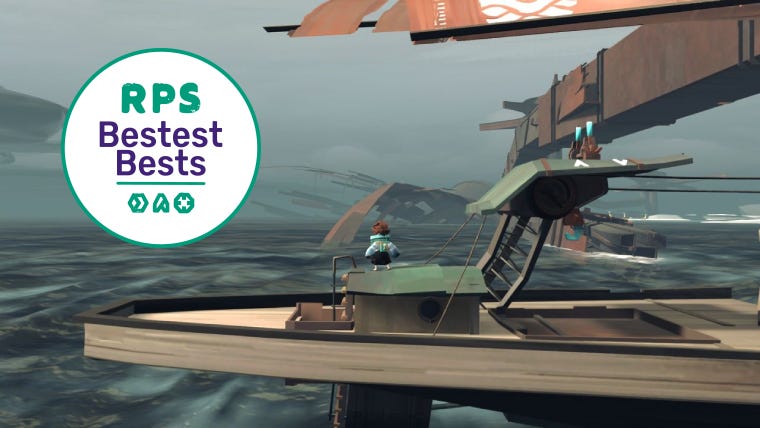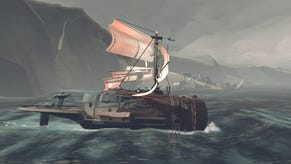FAR: Changing Tides review: a delightful adventure you'll be glad you played
We are sailing
The first FAR game, Lone Sails, was an unexpected wonder full of novelty and invention within the confines of a little cinematic platformer. As with the previous entry, FAR: Changing Tides tasks you with scurrying around a hulking vessel to manage the various contraptions that keep it moving. Only this time, instead of a strange land sail-train, you've a slightly more conventional submersible house boat.
At a glance, and for the first hour or two, much remains the same. The game involves alternating between tactile machine management and slow, gentle transit over gorgeous, painterly landscapes. This familiarity is by no means a criticism. More of the same in this case involves a repeat of one of my favourite little games of the last few years, and the team at Okomotive really have a knack for compelling vistas. The nautical variation adds some immediate novelty as we move through small set pieces ad setbacks, raging seas and treasure diving. Changing Tides takes place in a similar post-apocalyptic setting but unlike the first, its not quite as tranquil. Lone Sails was a world broken but almost at peace, moving on pleasantly without human rule. This time the world is more turbulent and there's a sense that whatever happened occurred much more recently, with violent floods tearing through the world. (Players who finish the game will surmise this not to be literally the case).
Your character, a young boy, begins mid-plunge in the water, and it takes a little longer before you have your signature vessel. But I love this little dudes energy! That big fluffy hair? He's just doing his thing. His big sleeves and oversized diving suit are a compliment to the underwater locations where you'll be spending most of your time, which he moves through with surprising speed, if not much grace. The good vibes he exudes are a contrast to this crumbling world, which has a pervasive melancholy. Lone Sails felt like a game about the whimsy of travel but Changing Tides very much feels like a search for something lost. Or perhaps moving on from that loss. It's a bit of a different atmosphere, is the thing. It has much more varied moods than the first game, which was mostly too gentle to have the moments of unease and foreboding that can be found in its sequel.
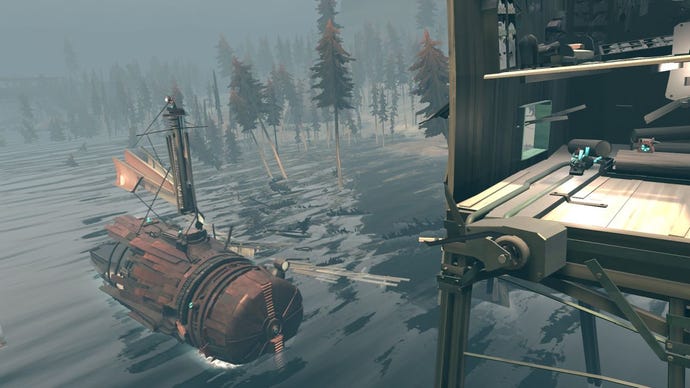
The central vessel itself is a diverse contraption, containing more gadgets and novel machines than your landship in Lone Sails, as well as being a decent portion larger. There's a bit more micro-management than before too, as you have to carefully adjust sails and adjust speeds. You'll still be balancing the use of sail and engine power, though, since dipping too deep into the fuel reserves will mean burning up the precious little trinkets you've gathered along the way. I was upset when I had to sacrifice a little music box to keep us going through a storm. I did, however, manage to take a potted plant from the very start of the game to the end, a challenge I suggest you try too. Especially since Changing Tides throws a lot of different obstacles in your path. I really enjoyed how the wordless story means everything has to be delivered diegetically, and so there's little artifice to its puzzles. You get properly rooted in its world.
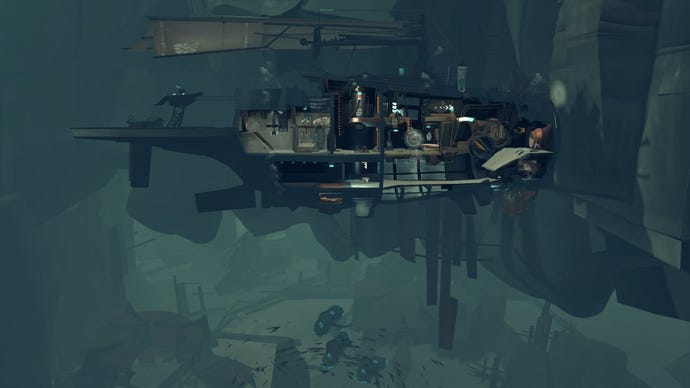
Every time an obstacle came up, I'd get the wee lad to leap to action while thinking "Oh, I know what we can use for this!", like a big kid who's gotten their first toolbox. Childlike sensibilities are a defining part of the game. While there's a thoughtful detail to the machinery, it's all operated by massive buttons and levers, simplifying systems into something that makes sense while being easier to understand. If you got this ship as a toy as a child it would be your favourite one. Each piece of it is lovely to watch in motion, and every little action to keep it moving involves a playful aspect, whether its leaping from the crows nest to pull up the sail or jumping up and down to pump air into the furnace. The way the side of the craft fades away to give you a cross section reminds me of those Star Wars books I saw as a kid that would show all the layers of a spaceship. Half the joy of the game is poking around and figuring out just what each bit of your craft does, all on your own. It taps into a potent kind of wonder as effortlessly as the first. A vehicle powered by toys and fun.
Of course some frustrations return, albeit slightly eased. Moving around is still awkward and you'll probably find yourself more than once hitting a button you didn't mean to. The clumsiness is presumably intended to a degree, perpetuating the idea of you as a kid in over their head, rushing like a daftie between each machine. It reaches points, though, where the fun wears off and the friction, while part of the experience, reaches a tipping point into distraction, and I ended up having to think way more about what I was literally doing to a controller rather than what I was supposed to be doing in-game. The improved ability to zoom-in and move the camera helps, though - I highly encourage using it while you run around the interior to better navigate all the little ladders and hatches.
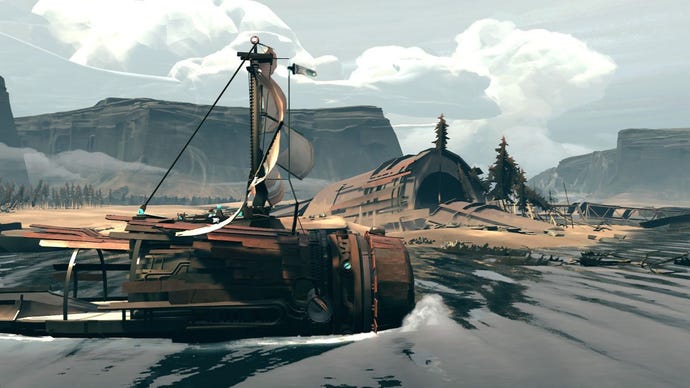
FAR: Changing Tides is another delightful little adventure but it feels like I'm underselling it to say so. Because it does surprise, especially towards the end, taking you to exhilarating places. Those little set pieces where you're not sure what it is your working towards until the last moment and then suddenly you see, with glee and excitement, what's about to happen next... that stuff is proper magic.
There's poignancy in it as much as the first FAR, but its mood feels a little more barbed, keen to lay a simple but heartfelt warning about climate change on players. For all the delight and wonder we strive to find here, there's no getting away from the surrounding doom or the struggles which follow. Hardship is more central to Changing Tides than Lone Sails. It moves backwards in time to the apocalypse while we move forward to meet it. Reconciling that unease is not something it treats lightly, yet there is still hope to be found. I'm grateful for that. If you give FAR: Changing Tides the handful of hours it takes to complete, I think you will be too.
